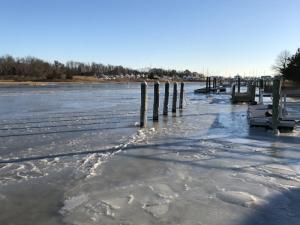Low temps and howling winds are taking a toll on plumbing throughout the Cape Region.
“We’ve had almost 100 calls since the weather got cold – lots of people with frozen pipes and frozen pumps in crawlspaces,” said Harry Caswell of Caswell Inc., a plumbing, heating and mechanical contractor.
Art Clendaniel of Clendaniel’s Plumbing and Heating has also been busy, responding to emergency calls.
“The damage has been overwhelming,” said Clendaniel. “It’s not just the cold. What really does it is the wind. It gets in the cracks of the house and drops the temperature like crazy.”
Repairing water damage is not cheap. Based on a recent analysis of five years of claims made between December and March, The Hartford said the average cost for repairs due to a frozen pipe is about $18,000, often a result of the cost of fixing drywall and floors.
This storm damaged not only homes, but infrastructure as well. Artesian Water Co. responded to more than 35 main breaks or leaks and 65 frozen service lines or meters through Jan. 9 in Sussex, Kent and New Castle counties and in Cecil County, Md. The water mains were broken by the shifting of the ground as a result of the severe cold, company officials said.
Caswell and Clendaniel both emphasized that virtually all the damage they’re seeing to Sussex County homes and businesses could be avoided.
“To start off, if people are going to leave their house for more than a week in the winter, they need to turn the water off,” said Caswell. “A lot of insurance companies won’t cover the damage if you don’t.”
Paul Sarnack, an Allstate agent based in Lewes, verified that is true in some situations. “Most losses are determined on a case-by-case basis,” he said. “Damage from pipes that burst might not be covered if it is determined that reasonable care was not provided to prevent the damage. That includes not maintaining heat in the home or not shutting the water off when you leave for an extended time.”
Caswell and Clendaniel also noted the importance of mitigating threats in basements and crawlspaces.
“Whether it’s a mobile or regular home, you’ve got to stop the draft,” said Caswell, who said he’s gone to many such homes and found virtually no protection for exposed pipes.
“If you can look underneath your house and see any light coming through, you’re going to be in trouble,” Clendaniel added.
“If you have a well pump inside your crawl space, they can also freeze and break,” Caswell said. “A floodlight can keep it warm, but a 65- or 75-watt light bulb can do it too. Just clamp the light close to the pump to keep it from freezing.”
Sandi Minard Jackson, a rental agent with Jack Lingo, said, “We encourage our tenants and owners to allow a faucet or two to drip to keep pipes from freezing.” She also recommends keeping heat to 55 degrees or above. “Tenants and owners also need to make sure gas tanks are full before a major storm hits. Gas companies are three days out on deliveries,” she said.
“The most important thing is to winterize before the cold weather comes,” Jackson added. “We see lots of issues with outside showers and outside spigots. Come November the water to them needs to be completely shut off. Hoses need to be disconnected and spigots need to be covered.”
Caswell and Clendaniel also urged residents and business owners to understand what to do if their pipes do burst.
“Everyone should know where their water shutoff and water meter are . . . and where water comes in from the street,” Caswell said.
While reinforcing such recommendations, The Insurance Information Institute also urges property owners to keep fireplace flues closed when fireplaces aren’t being used, and to watch for ice dams near gutter downspouts, which can cause water to build up and seep into the house.
Not surprisingly, Clendaniel and Caswell both encouraged property owners to contact a qualified plumber to inspect their buildings for issues that could lead to burst pipes.
“We’ll give you an estimate of what it’ll cost to fix problems, at no charge,” said Caswell.























































